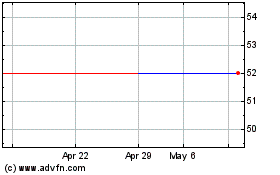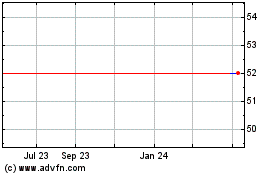U.S. Activist Investor Is Rebuffed in Hyundai Vote -- WSJ
March 23 2019 - 2:02AM
Dow Jones News
By Eun-Young Jeong
This article is being republished as part of our daily
reproduction of WSJ.com articles that also appeared in the U.S.
print edition of The Wall Street Journal (March 23, 2019).
SEOUL -- Elliott Management Corp. lost its battle to boost
dividends and gain board seats at South Korean auto giant Hyundai
Motor Group, highlighting the challenge that activist firms face in
proxy fights with Asia's family-run businesses.
The U.S. hedge-fund manager had scored a victory against Hyundai
last year when the conglomerate called off a corporate
restructuring that Elliott said lacked business rationale and hurt
shareholders.
New York-based Elliott, founded by billionaire Paul Singer, is
one of the biggest shareholder activists globally, with around $35
billion in assets. In Asia, Elliott previously targeted South
Korea's largest conglomerate, Samsung, and Hong Kong's Bank of East
Asia, with mixed results.
On Friday, shareholders at Hyundai Motor Co. and its auto-parts
affiliate Hyundai Mobis Co. rejected Elliott's proposals for
one-time dividends totaling 7 trillion South Korean won ($6.2
billion), more than four times what the companies' boards proposed.
The companies also prevailed with their nominees for independent
board seats.
The two publicly traded companies are part of Hyundai Motor
Group, which isn't itself listed. As of November, Elliott owned 3%
of Hyundai Motor and a 2.5% stake in Hyundai Mobis,
Lee Sung-won, vice president at Truston Asset Management, a
longtime investor in both Hyundai companies, said he couldn't side
with Elliott despite his dissatisfaction with the dividend plan
offered by Hyundai Mobis's board. "Elliott's proposals were too
extreme," he said. Mr. Lee had no objections to the Hyundai Motor
board's plan.
Elliott's dividend proposals won 13.6% of the vote at Hyundai
Motor and 11% at Hyundai Mobis.
"Elliott is encouraged by the support that the shareholder
proposals received from independent shareholders of HMC and Mobis,"
said a spokesman for the hedge fund. "We are confident that the
future holds further improvements at Hyundai."
Combined, Hyundai Motor and affiliate Kia Motors are the world's
fifth-largest car maker.
Elliott is expected to seek a voice in the South Korean auto
maker's coming restructuring, which many investors view as part of
an effort by the Chung family to transfer ownership of Hyundai from
father to son. It will require a two-thirds approval from
shareholders, a higher threshold than the majority needed in
Friday's dividends votes.
The Chung family controls roughly 30% of shares in the two
Hyundai affiliates.
The share prices of Hyundai Motor and Hyundai Mobis have dropped
18% and 16%, respectively, since Elliott announced its ownership
positions in April.
In making a case for the larger dividends, Elliott argued that
Hyundai's cash reserves exceed the industry average and are poorly
managed. In 2018, Hyundai Motor recorded a net cash balance of 12.7
trillion won and Hyundai Mobis held 7.4 trillion won.
Hyundai said it needs the cash for new investments, such as
acquisitions and self-driving car technology, and both affiliates
pledged last month to boost shareholder returns.
In Hong Kong, Elliott has engaged in a multiyear battle to force
a sale of Bank of East Asia, under Chairman and Chief Executive
David Li.
In South Korea, Elliott narrowly lost a 2015 proxy fight against
Samsung over a merger that helped the conglomerate's
third-generation heir cement control over Samsung Electronics Co.,
the world's largest smartphone maker. Samsung Electronics, which
Elliott later took a stake in, has since boosted dividends and
share buybacks.
Multiple shareholder activist campaigns not involving Elliott
are unfolding in South Korea.
"Companies are now making more efforts to communicate and listen
to shareholder demands," said Kim Yun-kyung, corporate research
director at Korea Economic Research Institute.
Shareholder activism has surged in Asia, with more than 10 times
as many campaigns in 2017 as in 2011, according to a J.P. Morgan
report, reflecting growth in foreign shareholdings and local
regulations promoting corporate governance.
Mary Ryu contributed to this article.
Write to Eun-Young Jeong at Eun-Young.Jeong@wsj.com
(END) Dow Jones Newswires
March 23, 2019 02:47 ET (06:47 GMT)
Copyright (c) 2019 Dow Jones & Company, Inc.
Hyundai Motor (PK) (USOTC:HYMLY)
Historical Stock Chart
From Mar 2024 to Apr 2024

Hyundai Motor (PK) (USOTC:HYMLY)
Historical Stock Chart
From Apr 2023 to Apr 2024
